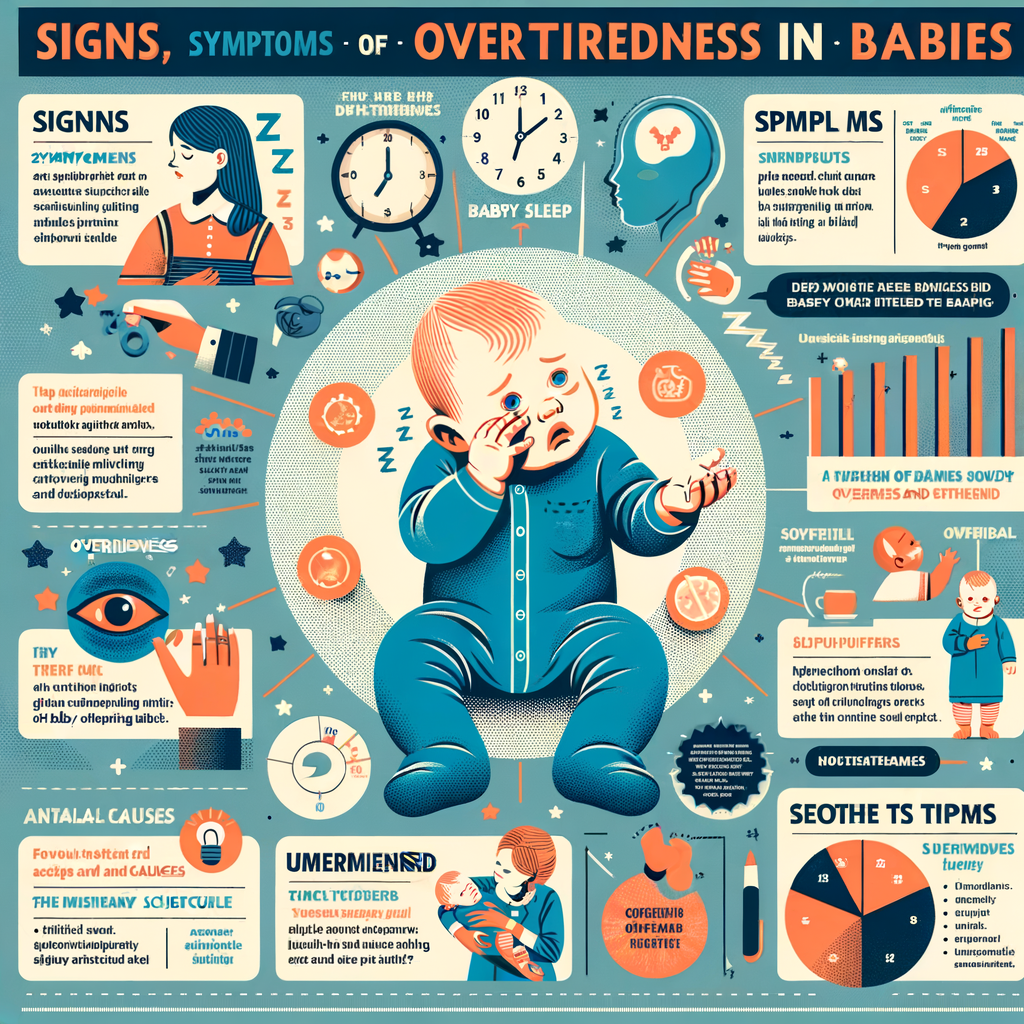
Introduction to Baby Sleep Patterns
Understanding the sleep patterns of babies is crucial for their health and development. In this section, we’ll delve into the importance of baby sleep and discuss a typical baby sleep schedule.
- Understanding the Importance of Baby Sleep
- Typical Baby Sleep Schedule
When babies sleep, their bodies are hard at work. Sleep is a crucial time for growth and development. During sleep, the brain forms new pathways that help babies learn and remember information. It’s also when their bodies grow and repair cells. According to the American Academy of Pediatrics, adequate sleep is linked to improved attention, behavior, learning, memory, emotional regulation, and overall quality of life. It’s clear that sleep plays a vital role in a baby’s health and well-being.
Babies’ sleep schedules can vary greatly. However, most newborns sleep a total of about 16 to 17 hours a day, including nighttime sleep and naps. Typically, babies do not stay awake for more than 2 hours at a time. By 3 months, many babies start to develop a more predictable sleep pattern, often sleeping for longer stretches at night and taking 3 to 4 naps during the day. By 6 months, many babies sleep 10 to 12 hours at night, with 2 to 3 daytime naps.
Understanding your baby’s sleep patterns and needs can help you create a conducive sleep environment and routine. This, in turn, can promote better sleep quality and overall health for your little one.
Signs of Overtiredness in Babies
Recognizing the signs of overtiredness in babies can be a crucial step towards ensuring their health and well-being. Overtiredness can lead to a variety of problems, including difficulty in falling asleep and restlessness. Here, we will discuss the physical symptoms that may indicate your baby is overtired.
Physical Symptoms of Baby Fatigue
Physical signs are often the first indicators of overtiredness in babies. These signs can be subtle, so it’s essential to pay close attention to your baby’s behavior and body language. Here are some common physical symptoms:
- Constant yawning: Yawning is a natural response to tiredness. If your baby is yawning frequently, it could be a sign that they are not getting enough sleep.
- Rubbing eyes: Babies often rub their eyes when they are tired. This is a clear sign of fatigue and can indicate that your baby needs more rest.
- Difficulty in falling asleep: Ironically, an overtired baby may have trouble falling asleep. This is because overtiredness can overstimulate a baby’s nervous system, making it harder for them to relax and fall asleep.
These physical symptoms can be a clear indication that your baby is not getting the rest they need. If you notice these signs, it may be time to adjust your baby’s sleep schedule or routine to ensure they are getting enough sleep.
Behavioral Signs of Infant Overtiredness
When your infant is overtired, they may exhibit certain behaviors that are out of the ordinary. These signs can be a clear indication that your little one needs rest. Let’s delve into some of these behavioral signs:
- Increased Fussiness: One of the most common signs of overtiredness in infants is an increase in fussiness. This can manifest as crying, whining, or general irritability. When a baby is overtired, they can find it difficult to self-soothe, leading to heightened fussiness. According to a study by the National Sleep Foundation, overtired babies are 50% more likely to exhibit increased fussiness compared to well-rested babies.
- Hyperactivity: Paradoxically, an overtired baby may also show signs of hyperactivity. This is because their bodies are fighting sleep, leading to a surge in adrenaline. This can make them seem more active than usual. However, this hyperactivity is usually short-lived and is followed by a crash where the baby becomes extremely tired.
- Decreased Feeding: Another sign of overtiredness in infants is decreased feeding. When a baby is too tired, they may lack the energy or interest to feed properly. This can lead to weight loss or slow weight gain, which can be a concern. Therefore, it’s important to ensure your baby gets enough rest to maintain their feeding schedule.
Understanding these signs can help you better manage your baby’s sleep schedule and ensure they get the rest they need. Remember, every baby is unique and may exhibit different signs of overtiredness. If you notice any drastic changes in your baby’s behavior, it’s always best to consult a pediatrician.
Causes of Baby Overtiredness
Understanding the causes of baby overtiredness is crucial for parents. It helps in identifying the root of the problem and finding the right solutions. Here are some of the common reasons why your baby might be overtired:
- Irregular Sleep Schedule
- Overstimulation
- Illness
- Teething
Babies thrive on routine, especially when it comes to sleep. An irregular sleep schedule can disrupt their internal body clock, leading to overtiredness. For instance, if a baby doesn’t nap at the same time each day or goes to bed too late, they may struggle to fall asleep and stay asleep. This can result in a cycle of overtiredness.
Overstimulation can occur when a baby is exposed to too many activities, noises, or people. This can overwhelm their senses and make it hard for them to calm down and sleep. It’s like trying to fall asleep in a loud, busy room – it’s just not conducive to restful sleep.
When babies are sick, they often have trouble sleeping. This could be due to discomfort, pain, or difficulty breathing. For example, a baby with a cold might struggle to sleep because of a stuffy nose. This can lead to overtiredness.
Teething can be a painful process for babies, and it can significantly disrupt their sleep. The discomfort and pain can make it hard for them to fall asleep and stay asleep, leading to overtiredness. It’s important to note that teething can start as early as three months and continue until a child is about three years old.
By understanding these causes, parents can take steps to help their babies get the sleep they need. Remember, every baby is unique, and what works for one might not work for another. It’s all about finding what works best for your baby and sticking to it.
Dealing with Overtired Babies
When your baby is overtired, it can be a challenging situation for both of you. The baby is exhausted, yet unable to fall asleep, leading to fussiness and crying. Here, we will discuss some effective strategies to soothe an overtired baby and help them get the rest they need.
How to Soothe an Overtired Baby
There are several proven methods to help soothe your overtired baby. These methods are simple to implement and can make a significant difference in your baby’s comfort and sleep quality.
- Creating a quiet and calm environment: Babies are sensitive to their surroundings. A noisy or chaotic environment can overstimulate them, making it harder for them to relax and fall asleep. Try to create a quiet and peaceful environment, turning off loud music, dimming the lights, and keeping the room temperature comfortable. This can help your baby calm down and prepare for sleep.
- Swaddling: Swaddling is a technique that involves wrapping your baby snugly in a blanket. This can mimic the feeling of being in the womb, providing comfort and security. Many babies find this soothing and it can help them fall asleep faster. Remember to always swaddle safely, ensuring your baby can breathe easily and is not too hot.
- Gentle rocking: Gentle rocking can be very soothing for a baby. The rhythmic motion can help calm them down and prepare them for sleep. You can rock your baby in your arms, in a rocking chair, or in a baby swing. Be sure to always hold your baby securely and never leave them unattended in a swing or rocker.
Remember, every baby is unique and what works for one may not work for another. It may take some trial and error to find the best methods to soothe your overtired baby. However, with patience and consistency, you can help your baby get the rest they need.
Establishing a Regular Sleep Schedule
One of the most effective ways to deal with an overtired baby is to establish a regular sleep schedule. This can help regulate your baby’s internal clock and promote better sleep. Here are three key steps to consider:
- Consistent Bedtime Routine
- Daytime Naps
- Avoiding Overstimulation Before Sleep
Establishing a consistent bedtime routine can signal to your baby that it’s time to sleep. This routine could include activities like a warm bath, a bedtime story, or a lullaby. According to a study by the National Sleep Foundation, a consistent bedtime routine can help babies fall asleep faster and sleep for longer periods.
Daytime naps are crucial for your baby’s growth and development. However, it’s important to ensure that these naps are not too close to bedtime as this can interfere with nighttime sleep. The American Academy of Pediatrics recommends that babies under 1 year should have two to three naps per day, each lasting 1 to 3 hours.
Overstimulation before bedtime can make it harder for your baby to fall asleep. This includes activities like playing with toys that have bright lights or loud sounds. Instead, opt for calm and quiet activities like reading a book or giving a gentle massage. As per a study in the Journal of Sleep Research, a calm environment can significantly improve a baby’s sleep quality.
In conclusion, establishing a regular sleep schedule for your baby can significantly improve their sleep quality and reduce overtiredness. Remember, consistency is key. With patience and consistency, your baby will eventually adapt to this schedule and sleep better.
Baby Sleep Problems and Overtiredness
When it comes to your baby’s sleep, overtiredness can pose a significant problem. It’s crucial to understand the impact of overtiredness on your baby’s sleep quality and the potential long-term effects of sleep deprivation.
- Impact of Overtiredness on Baby’s Sleep Quality
Overtiredness can drastically affect your baby’s sleep quality. When a baby is overtired, they may have difficulty falling asleep and staying asleep. This can lead to frequent night awakenings and shorter sleep durations. The sleep they do get may be restless and not as restorative as it should be.
Research shows that babies who don’t get enough sleep may not progress through the sleep cycles properly. This can prevent them from reaching the deep, restful stages of sleep they need for proper growth and development.
- Long-term Effects of Sleep Deprivation in Babies
Chronic sleep deprivation can have serious long-term effects on babies. Studies have linked insufficient sleep in early childhood to problems with mood, behavior, learning, and overall health.
For instance, babies who regularly don’t get enough sleep may have trouble with emotional regulation, leading to increased fussiness and irritability. They may also have difficulty focusing and learning new skills. In terms of health, chronic sleep deprivation can weaken the immune system and increase the risk of obesity and other health problems later in life.
In conclusion, it’s essential to ensure your baby gets enough sleep and to address any issues of overtiredness promptly. By doing so, you can help promote better sleep quality and prevent the potential long-term effects of sleep deprivation.
Conclusion: Managing Baby Fatigue
As we conclude, it’s important to understand that managing baby fatigue is a crucial aspect of parenting. It’s not just about getting your baby to sleep, but also about understanding their sleep needs and dealing with overtiredness effectively. Let’s recap the importance of these aspects and the key takeaways from this post.
- Importance of understanding baby’s sleep needs
Understanding your baby’s sleep needs is the first step towards managing baby fatigue. Babies have different sleep patterns compared to adults. They need more sleep and have shorter sleep cycles. By understanding these needs, you can create a conducive sleep environment for your baby, helping them get the rest they need and preventing overtiredness.
- Key takeaways for dealing with baby overtiredness
Dealing with baby overtiredness can be challenging but it’s not impossible. Here are some key takeaways from our discussion:
- Recognize the signs: Overtiredness in babies can manifest in different ways such as fussiness, difficulty sleeping, and frequent waking. Recognizing these signs early can help you take steps to manage it.
- Establish a routine: A consistent sleep routine can help regulate your baby’s sleep patterns and prevent overtiredness.
- Respond to your baby’s needs: Every baby is unique. Responding to your baby’s individual needs can help manage overtiredness effectively.
- Seek professional help: If you’re struggling to manage your baby’s overtiredness, don’t hesitate to seek help from a healthcare professional.
In conclusion, managing baby fatigue requires understanding, patience, and consistency. By understanding your baby’s sleep needs and learning how to deal with overtiredness, you can ensure that your baby gets the rest they need for healthy growth and development.














